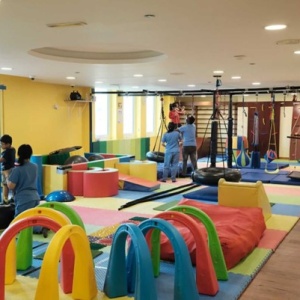When you’re a parent of a child who faces developmental challenges, it can feel like you’re constantly searching for solutions to help them thrive. That’s where Able UK comes in. Known for its comprehensive therapy programs, Able UK provides children with the tools, support, and individualized care they need to thrive and live wholesomely. Whether your child struggles with communication, social skills, or emotional regulation, Able UK has a variety of programs designed to meet each child’s unique needs.
In this article, we will X-ray a typical day at Able UK. We will explore how the different therapy programs we offer work and how they can have a profound impact on the children and families we work with.
A Warm Welcome: Starting the Day with Familiar Faces
At Able UK, children start their day in a warm and welcoming environment. Therapists and staff greet each child by name, fostering an atmosphere of familiarity and trust. This might not seem like much, but for children who struggle with anxiety, change, or social interactions, this predictable, friendly routine makes all the difference.
Parents often appreciate the open communication lines they have with therapists, whether it’s a quick chat during drop-off or more formal progress updates. Right from the start, we believe in the power of partnership between parents and professionals.
The Therapy Programs in Action
ABA Therapy: Building Lifelong Skills
One of the cornerstone services at Able UK is Applied Behaviour Analysis (ABA) Therapy. Tailored specifically for children with autism or other developmental challenges, ABA Therapy uses evidence-based techniques to teach skills and encourage positive behaviours.
In the morning, children often begin with one-on-one ABA therapy sessions. These sessions are customized to meet each child’s needs, focusing on areas like communication, self-care, and social skills. The beauty of ABA therapy is in its structured approach, breaking down complex tasks into manageable steps.
During the session, the therapist might use something as simple as snack time to teach patience and communication. For instance, if a child wants a snack, the therapist encourages them to use words or gestures to ask politely.
Speech Therapy: Finding Their Voice
For children with speech and language difficulties, Able UK’s speech therapy sessions can be a game-changer. These sessions might be integrated into the day after a child’s ABA therapy. Working with experienced speech therapists, children practice pronunciation, sentence structure, and other communication skills in a fun, engaging way.
Playful activities and games are introduced in the therapy sessions to make it more engaging for children. For example, a therapist can hold up a toy dinosaur and ask the child to describe it. Maybe the child struggles to find the right words or gets stuck on a particular sound. Through playful interaction, repetition, and positive reinforcement, the therapist helps the child build confidence in their communication abilities. Over time, these small victories add up, allowing children to express themselves more clearly and effectively.
Occupational Therapy
In the mid-morning, it might be time for Occupational Therapy (OT). For children who have challenges with motor skills, sensory processing, or self-regulation, OT is vital. Occupational therapists at Able UK use fun activities that feel more like play than therapy, which helps keep the children engaged.
Children might work on tasks like buttoning a shirt, holding a pencil correctly, or jumping on a trampoline to improve balance and coordination. These activities not only help with physical development but also boost self-esteem as children gain independence.
Able UK also offers sensory integration therapy for kids who are overwhelmed by certain stimuli. The therapists use tools like weighted blankets, fidget toys, or sensory swings to help children regulate their bodies and emotions better. These strategies can then be carried over to home life, making it easier for children to cope with everyday environments.
Group Therapy: Learning with Peers
After a break, children might join group therapy sessions where they can practice social skills in a safe, supportive environment. These group settings allow children to interact with their peers, taking turns, sharing, and participating in group activities. Social skills don’t come naturally for every child, especially those with autism or ADHD, so practicing in a controlled environment can be incredibly helpful.
Therapists often use games and role-playing exercises to teach concepts like waiting, asking for help, and maintaining eye contact. Over time, these skills become more ingrained, and children begin to use them outside the therapy setting, like in school, with family, and during playdates.
Tailored and targeted sessions that might be offered in the afternoon include;
Cognitive Therapy and Emotional Regulation
Cognitive Therapy: As the day progresses, children might engage in cognitive therapy to develop their thinking and problem-solving skills. This could involve puzzles, memory games, or tasks that require the child to follow multi-step instructions. The goal is to enhance the child’s cognitive flexibility, working memory, and ability to process information.
During these sessions, therapists closely monitor the child’s progress and adjust the level of difficulty based on their needs. For instance, if a child is mastering basic puzzles, the therapist will introduce more challenging ones to keep them engaged and growing.
Emotional Regulation: For children with emotional or behavioural challenges, the ability to regulate their feelings is key. That’s why many children at Able UK spend time working on emotional regulation. This might be through mindfulness exercises, guided relaxation, or simple breathing techniques that help them manage anxiety or frustration.
Children might use stress balls, breathing apps, or visual timers to help them calm down during stressful moments. These tools become invaluable when the child faces challenging situations outside of therapy.
Conclusion: Unlocking Potential, One Day at a Time
At Able UK, every day is filled with opportunities for children to grow, learn, and thrive. Through a combination of ABA therapy, speech and occupational therapies, and emotional support, children are given the tools they need to navigate their world with confidence. It’s not just about teaching them specific skills; it is about empowering them to lead more independent, fulfilling lives.


16 comments
Authentic pork carnitas recipe
October 4, 2024 @ 4:07 amI found this post to be very informative and well-organized. Your detailed analysis and clear explanations make it a pleasure to read. The practical examples you included were particularly helpful. Thank you for sharing your knowledge with us.
Business English Lesson Plans
October 4, 2024 @ 5:00 amAn informative and well-written piece. The principles are easily understood and applied thanks to your thorough explanations and practical examples. Thank you for taking the time to provide such detailed information. Your time and knowledge are much appreciated.
guest posting
October 5, 2024 @ 3:23 amThanks for tackling this subject, it was a great read.
Online English courses
October 5, 2024 @ 3:27 pmYour article really hit home for me—thank you!
Online English courses
October 6, 2024 @ 3:30 pmI learned a lot from this post—thank you!
Pork fajitas with onions
October 7, 2024 @ 8:23 amExcellent piece! Your thorough summary is much appreciated. I now see the issue from a different angle thanks to your insightful comments. You made your points quite clearly with the examples you included. You have my gratitude for penning this.
E-commerce guest posting
October 9, 2024 @ 1:04 amThis post was well worth the read—thank you!
스카이 슬롯커뮤니티
October 10, 2024 @ 5:00 pmI really appreciate the way you explained this.
Boost your SEO with guest posting
October 13, 2024 @ 7:34 pmYou’ve done an amazing job with this article.
Business growth strategies for startups
October 17, 2024 @ 7:09 pmThis was a very comprehensive post, I learned a lot.
Scalable software solutions for companies
October 18, 2024 @ 6:41 pmYou’ve really captured the essence of this topic.
Small business sales training
October 22, 2024 @ 1:55 amI feel much more informed after reading this—thanks!
Fish Fixation reviews
October 22, 2024 @ 5:01 amYour article was well-organized and informative—great work!
lottofy
February 17, 2026 @ 3:45 pmLottofy caught my attention since I heard a friend won, It’s easy to load up, I’m taking a shot and will let you know next week the outcome! check it out lottofy.
max88bet
February 17, 2026 @ 3:46 pmAlright folks, trying my luck with max88bet! Heard some good things, hope it lives up to the hype. Wish me luck! Check it out here: max88bet
nn88t
February 17, 2026 @ 3:46 pmHeard about nn88t and thought I’d give it a go. Looks promising so far. Anyone else had good experiences? Find it here: nn88t